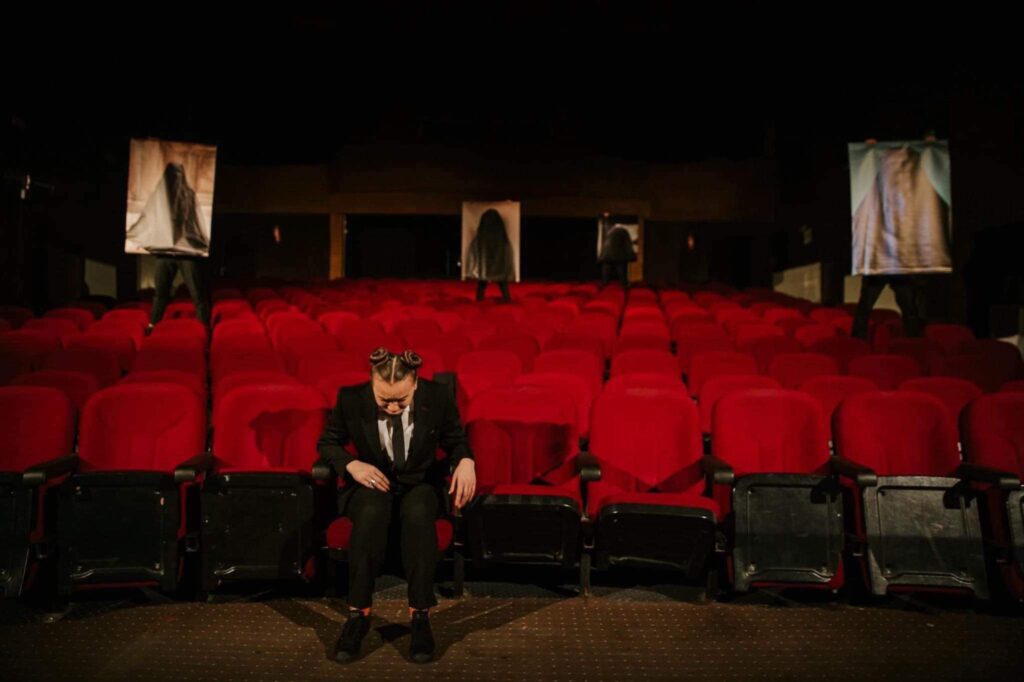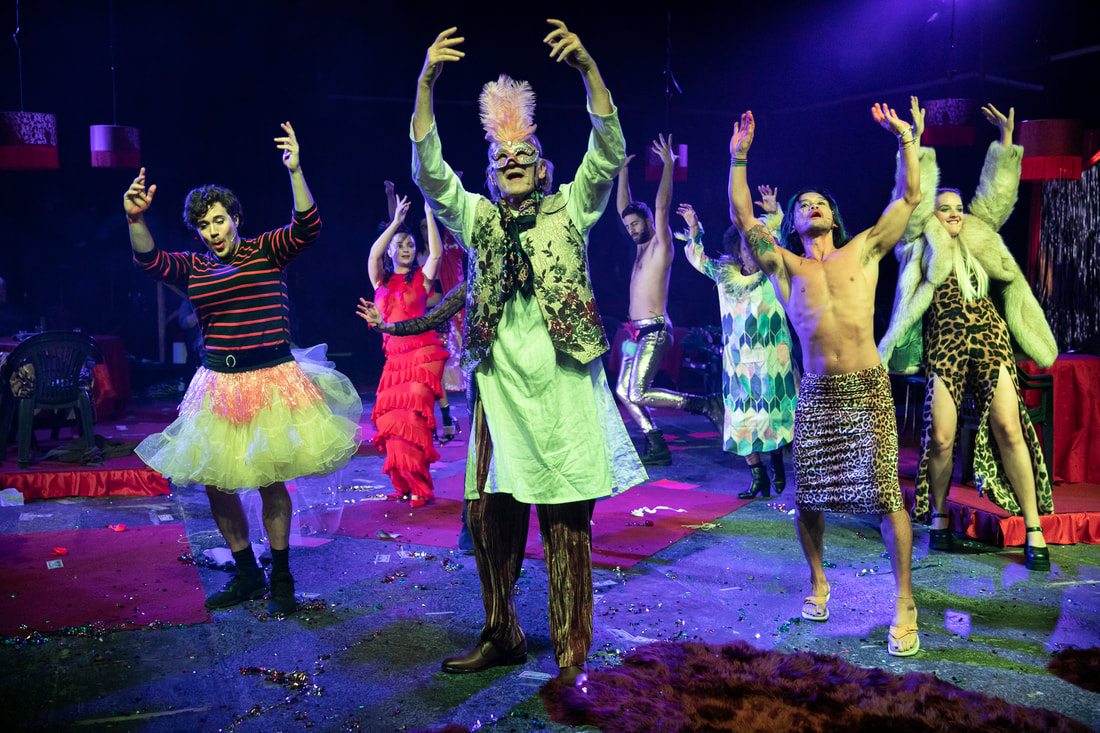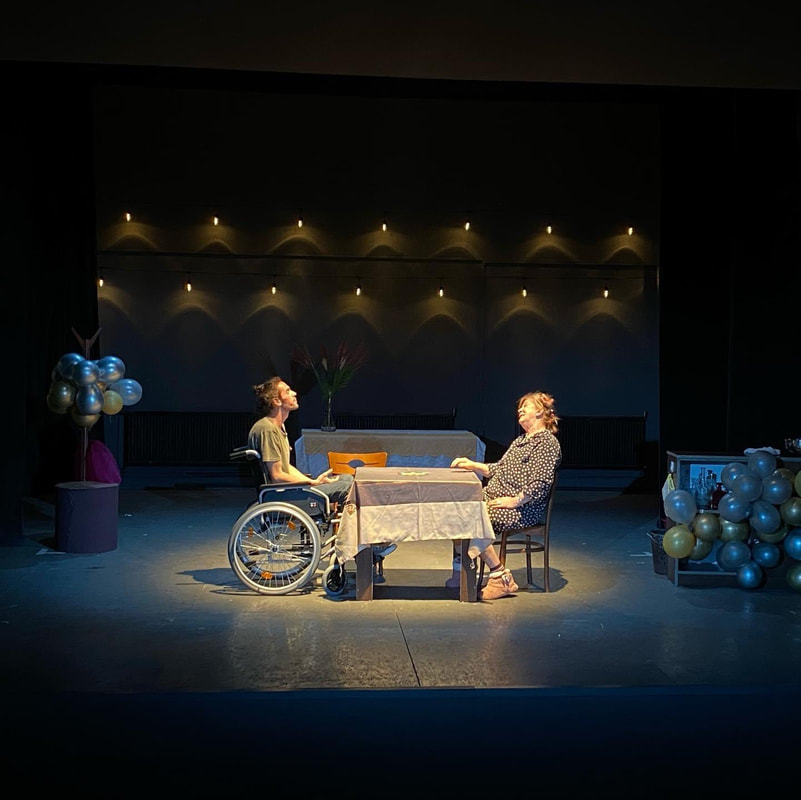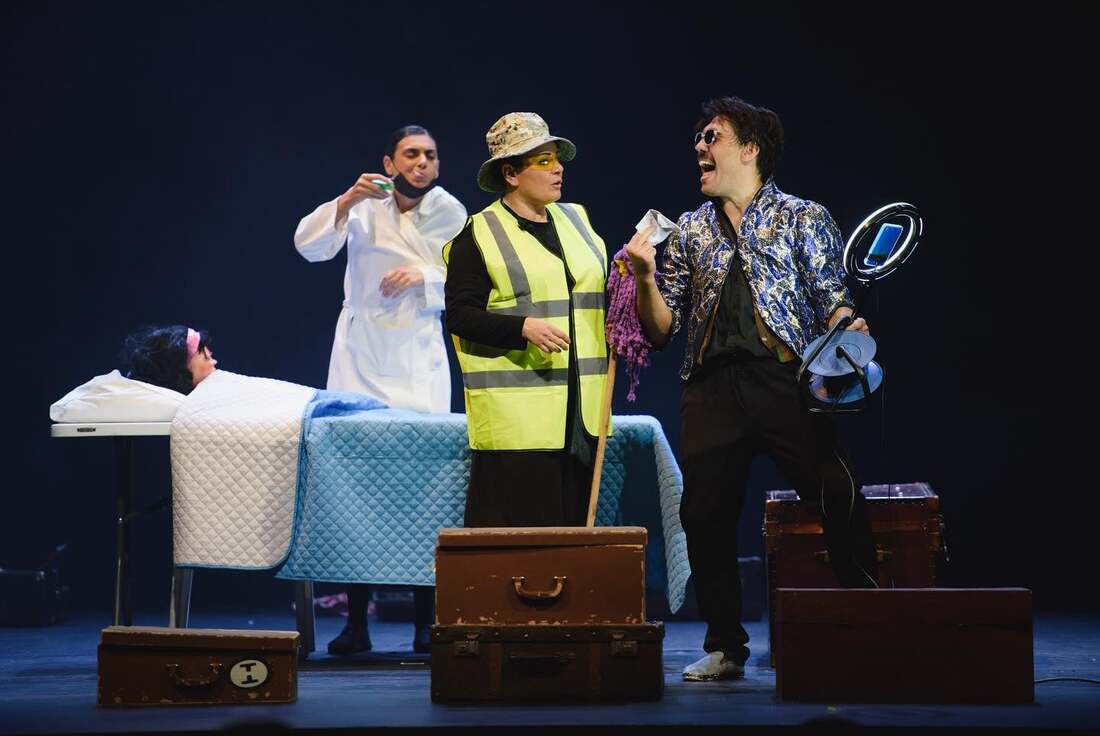|
Review by Flamur Dardeshi As the lights dim, the four actors start moving through the theatre, as if they are swimming in the sea. The audience are sitting on the stage, looking out at the seats. The lights from the arena's far end fall on these seats, creating the illusion of waves.
The actors appear as if they have emerged from the sea. Director Blerta Neziraj's idea to seat the audience on stage is a brilliant one; Yann Perregaux's lighting design is also inspired. The actors are dressed alike (the costume design is by Mentor Berisa) to maintain their neutrality; they are citizens without names or surnames. We are in Roccalumera, a small town in the south of Italy, where no refugees have ever arrived. This has caused widespread depression in the city. Dreams of boats being emptied in the city's harbour sweeten citizens' sleep, but they are only dreams. All the money from the European Union is going to Lampedusa and other Italian cities where there are refugees, “the bloody bastards” says one of the characters. Even the cat, Sonno, the only cat in town, decides to leave forever because of this. That's how small fishing towns are, living with what the sea brings to shore. Then someone appears in the ‘sea-seats’ and slowly, his body passing from seat to seat, he comes to our feet and flows to the shore. The person is both dead and not a refugee - it’s the body of an Italian. But the people of Roccalumera are good capitalists, if life gives them lemons, they make lemonade and sell it, so they decide to cut off the body’s penis and put him in a niqab, turning him into Roccalumera's first refugee. "Wherever there is one refugee there are many." Scene follows scene as there are press conferences and the much-anticipated funding arrives from the EU. Everything is getting better in the town now, even the cat Sonno returns. Jeton Neziraj’s writing is both genuine and artistically appealing. He creates a small fishing city between the theater seats and is able to depict the passage of time, piecing together brief scenes where little happens, like the fall of a handkerchief from a balcony, or even sometimes, nothing at all. Sitting on stage in front of the ‘sea’ you cannot deny the fact that nothing happens; we all have days like that, even in Roccalumera. Despite the fact that the movement between the theater seats does not appear comfortable, the actors do an impressive job. Gani Rahmani is able to quickly and convincingly convert himself into several roles (including Sonno the cat), and Tringa Hasani fits into her roles well and appears to be experiencing them. But happiness does not last long; since the dead body was an Italian, someone comes from the Italian mafia. And so he begins to murder the citizens while seeking among them the killer of his brother Giuseppe (the dead body, brought from the sea). Later, he discovers that Giuseppe is still alive and that everything was a misunderstanding, so he returns to his hometown leaving behind, as a way to apologize, his torture tools. “Make a museum,” he advises. As if saying: “do not forget.” The Roccalumera cat returns again. And this cat reminded me of all the Albanians I know, always trying to escape to the fabled West, but always returning back, if not physically, in some other way. A ship carrying real refugees approaches the shores of Roccalumera, but after everything the citizens lock the port and turn off the lights. Silence now. They remain silent so as not to be heard by the refugees. We on stage are also silent. This is when Jeton Neziraj decides to strike. He places one of the actors in the role of the god, speaking to us. Asking us what would we do if a van with an African family of 15 members standing in front of the theater now, which of us would go and pick them up and shelter them in our house? Thus the sea disappears and from Roccalumera we return to Gjilan, and from Gjilan, we go deep inside ourselves. In the last scene an actor dressed as Superman enters the stage holding a large frame covered in black fabric. He tells the story of a little boy, Aylan, who with his father had taken the sea route to Europe, to escape the war in Syria. Superman was Aylan's favorite toy, so he was not afraid, because his hero could save everyone. The fabric is removed to reveal the real photo of little Aylan, that the waves had washed ashore. Apparently, the sea required a sacrifice. The revelation of the photo in this way stunned the audience; some burst into tears. Superman, who saves everyone, could not save Aylan who never arrived in the promised land, in the free Europe where life would resume. Pablo Picasso says that the purpose of art is to clean the dust of everyday life from our souls. This play shook the dust from our shoulders. The dust that makes us forget the human inside us. It was like a strike for the audience: remember, it said, remember… Superman didn’t save Aylan, but can art do something? Can art save us all? By: Jeton Neziraj // Directed by: Blerta Neziraj // Ass. Director: Avni Shkodra // Cast: Aurita Agushi, Ernest Zymberi, Kushtrim Qerimi, Tringa Hasani, Gani Rrahmani dhe Alban Shahiqi // Stage Design and Costumes: Mentor Berisha // Choreography: Gjergj Prevazi // Music: Tomor Kuci // Light Design: Yann Perregaux // Translated into English by: Alexandra Produced by: the Gjilan City Theater, Gjilan In Roccalumera
0 Comments
Review by Borisav Matić Photo by: Ferdi Limani
An Orgiastic Musical in the Aftermath of War Imagine yourself at a hedonistic nightclub full of campy decorations, cheap furniture and guests that drown themselves in shots of rakia. Now imagine that bloodshed is happening everywhere around you, caused by unhealed traumas and unresolved conflicts of the just-finished war. Imagine that even in these morbid circumstances you'll be drawn by turbo-folk music to participate in orgiastic dances. Welcome to the world of Balkan Bordello. This flamboyantly dark anti-war show isn't just rich in story and style, but also in the production's prehistory. Jeton Neziraj's play has been directed twice before: once by Stevan Bodroža at the National Theatre of Montenegro in 2015, and András Urbán at the National Theatre of Kosovo in 2017. Both are prominent regional directors, but Urbán's unapologetic and provocative way of making political theatre alongside Neziraj;s critique of a post-war society might be the reason why the second show was greeted with protests and violent threats from Kosovo war veterans. However, this third directorial iteration by Blerta Neziraj takes place in a slightly different political environment. Albin Kurti, the Prime Minister of Kosovo who unlike his predecessors doesn't look back nostalgically at the war of the 1990s, attended the premiere. He did not appear provoked, rather relaxed enough to scroll on his cell phone during the performance, and not because he was composing an angry tweet because of the show. This production can also be seen as a milestone in artistic collaboration with Serbia that still doesn't recognize Kosovo as an independent country since the show is a co-production of Qendra Multimedia with Atelje 212, an institutional theatre from Belgrade, and also with LaMama theatre and the My Balkans organization from New York. Though the show feels very contemporary, the basis of its story is as classical as it can be – it's a rewriting of Aeschylus' Oresteia trilogy, and quite a faithful one. Jeton Neziraj has kept all the major plot points, focusing his adaptation on the contemporary world. The first big alteration is the setting, so the story takes place at a decadent but dismal and run-over-by-time Balkan Express Motel, and the second big change is the modernization of characters. Agamemnon is now a victorious military commander and war criminal with implicit but clear reference to the Kosovo war, while his wife Clytemnestra is the owner of the Motel who's ready to kill her husband in order to stop him from abusing her anymore. There's also a queer streak that runs through the production: Orestes and Pylades are now a queer couple. Jeton Neziraj's plot is satirical and the irony is only intensified by Blerta Neziraj's directing, which ensures that all elements of the show work towards this goal. The production's musical elements, its energetic electro-oriental sounds composed by Gabriele Marangoni, form suitable background to the play's songs about the seduction and absurdity of war. The satire is also mirrored in Gjergj Prevazi's choreography. On one hand, the characters meet the returning commander with almost ceremonial movements and the fighter, played by Ivan Mihajlović, performs an agile celebratory dance to his speech. On the other hand, there are often collective scenes of drunken dances with erotic elements, both homosexual and heterosexual. There's also Pylades, played by John Gutierrez as a choreographer from Berlin, fascinated by the locals' 'barbarism'; he wants to humanize them through dance – a clear critique of the West's hypocritical and cosmetic altruism. Pylades also teaches other characters basic dance steps at the most awkward times, for example after the murders that happen at the Motel. A thick layer of irony and campness might be the show's biggest protection from total nihilism. Even though the story is full of violent male characters, their traditional image of masculinity is subverted by their queerness. Not only is Orestes openly gay as an avenger of his father's honour, but so it seems is Agamemnon's fighter whose image of homophobia and aggressive masculinity cracks during a drunken interaction with Pylades. Agamemnon's image of masculinity seems sincere until the end, but he's the first one who gets killed almost at the beginning of the performance. The show feels to a certain extent like a post-gender society in which the characters are judged on their deeds and not so much on sexual or gender identity. This would explain the lavish, glittery and colorful scenography (Marija Kalabić) and costumes (Gabriel Berry) that are assigned to almost all characters. With actors coming from New York, Kosovo and Serbia, there was a risk of incoherence because of different acting styles, but it seems that's avoided. All actors adopted a grandiose, over-the-top approach that fitted very well into the concept of the show. George Drance as Agamemnon has a firm posture and elevated, formal manure of speech, only for this illusion of nobility to be scattered by his periodic outburst of anger and violence and Verona Koxha's frantic performance of Cassandra who's a traumatized victim of Agamemnon and the war. Svetozar Cvetković's exaggerated and loud gestures present him as a pretentious poet who deludedly believes that he and his fellow intellectuals are the founders of the new state and not the warlords. Cvetković's expressiveness only really comes into action in the second half of the performance, but this is an issue with the whole show. It feels like it's not polished enough and that everyone would benefit from a week or two of more rehearsals. There are issues with sound; it is sometimes a struggles to hear all the words, and some actors are heavily dependant on microphones while others are not. But the life of Balkan Bordello has just begun. The New York premiere is scheduled for April next year and it's almost certain that the cast and the whole show will come to function much more efficiently in the weeks and months ahead. A trans-Atlantic theatrical project of La MaMa's Great Jones Repertory Company, New York Author: Jeton Neziraj // Directed by: Blerta Neziraj // With: Onni Johnson, Svetozar Cvetković, George Drance, Eugene the Poogene, Valois Mickens, John Maria Gutierrez, Mattie Barber-Bockelman, Ivan Mihailović, Matt Nasser, Verona Koxha // Composer: Gabriele Marangoni // Costumes: Gabriel Berry // Stage design: Marija Kalabić // Choreographer: Gjergj Prevazi // Visual and light concept: Nico de Rooij // Dramaturges: Dimitrije Kokanov, Zishan Ugurlu // Producer of the Balkan Bordello: Beka Vučo // Production coordinator: Maud Dinand Lighting: Yann Perregaux / Review by Florida Kastrati As people sit on the theatre seats, the stage is already set. An old woman, whose hair is in the curlers, is waiting for us. She has been waiting for people to come and go in the same, dark room, every single day; for a long while, this has been her life.
The set, designed by Theranda Sertolli, consists of a table with two chairs, closed curtains, a small kitchen with all the ingredients of a cake waiting to be made. Some balloons in the back frame the audience’s view. Although inanimate, these balloons bring some color to this dull place. The play The Birthday, written by Ivor Martinić and directed by Iliriana Arifi, absorbs the spectators. From the very beginning, the actors and the staging catch your attention and hold it; you enter into the world of the play smoothly, almost without noticing it. The room has been adorned in this way for Denis’ 25th birthday. Denis was fine when he was a child but soon he became ill, and he lost his ability to walk. At first, he used crutches, and lately, as his health got worse, his family bought a wheelchair for him. His health is in constant decay, just as is the main characters’ approach to life. Denis chooses to be alone most of the time, using his wheelchair to go to the park, feed pigeons and sometimes even meet Sara. “I don’t love her, but she loves me and that’s just fine,” he says. You expect Denis to talk more, but he doesn’t. He chooses quietness and less crowded places, probably because he has had enough of people. The ones who know Denis think of his wheelchair as clumsy, and strangers can’t stop staring because they think of him as “different”. Mia, the housewife, Denis’ mom, the caretaker and much more, clearly doesn’t live life for herself. She is one of those women, of which there are many, who dedicate their entire being to their families, their husbands and children, and their husband’s family, their own family and even animals - cats and green canaries. Both Rebeka Qena who played Mia and Labinot Raci as Denis, played straight to the heart, deeply touching the audience with their affecting performances. They could transmit to the audience the routine of these characters’ lives, the routine of one single day, a routine that for the people in the play is that of a lifetime. The society in which the characters live is fully judgmental, their lives are full of regrets: people they haven’t been with, places they haven’t travelled, ardent dreams that now merely tempt the characters as delusional. They are caught in a paralyzed way of life. Mia can’t accept the fact that her 25-year-old paraplegic son can’t walk. She does the impossible for him to appear smiling and barely standing up in the yearly photos the family takes. And Mia loves her invalid son extremely. She loves him with that blind kind of love that deprives you of living. That kind of love that brings more darkness, despair and tears, for sickness is outside our control. But Mia knows that “Some things need to be saved and used moderately. Nice dresses, love, tears and things like that.” Although she doesn’t quite practice it in her life. Mia knows that she is keeping too much of a heavy burden with her, but can’t let go easily. Again, she forgets to turn on the lights of the room. And bang! One of the balloons pops by itself and the curtains drop down. The play ends. But the world, well, the world ends with a whimper right, rather than a bang? By: Ivor Martinić // Directed by: Ilirjana Arifi // Cast: Rebeka Qena, Labinot Raci, Igballe Qena, Bislim Muçaj, Sheqerie Buçaj, Florenta Bajraktari, Alketa Sylaj // Stage and Costumes: Theranda Sertolli // Light Design: Skender Latifi // Stage Technicians: Albert Gashi, Bedri Maloku, Fadil Bekteshi Review by Daniela Gjopalaj Black Hole: The asshole of the universe
A black hole is where gravity pulls so much that even light cannot get out. I’ve heard that these holes exist on earth also, in the cities of Kosovo. There, holes are dug, and from them sprout tall buildings, the fruits of which are enjoyed by the "few". In a corrupt state it is well-known who "the few" are. Better to fall in the asshole of the universe, than to live in a corrupt city like this. This seemed to me the message of the warm, humorous yet dramatic play, Madeleine’s Incident. In these days, when there are so many failed attempts at "alternative" plays, more "classical" plays like this are heart- warming for theater lovers. The play is written by Kosovar playwright, Jeton Neziraj and produced by Pocket Theater from Cyprus. The director is Marios Theocharous. Citizens are often left behind and communities like the Roma are even more left behind. Madeleine, the title character of the play, is Roma. The staging was filled with vivid colors that are characteristic of the Roma. Madeleine's mother, performed by Miranda Nychidou, is dressed in red and speaks the Greek language with a Roma accent. We see her also performing the role of the cleaner, of the nurse, of the official from a Kosovar institution, and the official from the German embassy. The father, performed by Andreas Nicolaides, wears a gold thread vest. He is a dreamer with a large heart, much of which is occupied by Madeleine. Nicolaides also plays the energetic showman, and the worker who digs the hole. Madeleine is represented by a puppet in a pink dress, performed by the actress Athena Savva dressed in black, a good choice to maintain neutrality. We see her also performing the role of the male doctor smoking cigarettes in the hospital room, another official from a Kosovar institution, and the official from the German embassy, the businessmen and the municipality representative. One of the most impressive characteristics of the Pocket Theater production was the performers' ability to play a variety of roles, even contradicting ones, while being completely transformed and conveying the nuances of each character to the audience. This kind of elasticity, along with a quickness in changing costumes, made a play with 13 characters, but just three actors, come from her family home to ours. Little Madeleine had a cheerful, lively voice, like children who see everything as a game. She burst like a popcorn kernel as she happily walked the streets of this post-war city, where it seems the enemy is now internal. Madeleine was born in Germany, where her family emigrated due to war in Kosovo, but after the war they were forced to come back. The only contact Madeleine has with Germany is a friend of hers, Katja, who has not heard from Madeleine for a long time, because she fell into a hole that was dug to create a new building, and she now is standing right in the middle of the black hole. While Madeleine is in a coma in the hospital, on stage we see corrupt doctors, corrupt businessmen, the media that tries to reflect the reality in their own way. The case of Madeleine went to the bureaucratic offices of Kosovo, with officials who aggressively ignored Madeleine's parents’ request for help. The roles of the officials are performed by Athena Savva and Miranda Nychidou. In the next scene, the same actresses are transformed into German embassy officials. They refuse Madeleine's parents' requests for assistance in obtaining a German visa so that she might be treated in Germany, but this time they respond nicely, in a European manner, where even the worst news is delivered with a smile. And while these are happening, in a world where not only humans but all of humanity has taken a back seat, it seems Madeleine made her decision. In her dream, Madeleine asks her father for a fast train, so fast that it would seem that it is flying. This is the most beautiful scene of the play. As in a dream, a scenario of magical realism is created between the real and the fantastic. Madeleine eventually spots the train in the horizon and joyfully embarks on her journey to another world. Somewhere beyond black holes and assholes. Where politics, money and corruption do not have the power to turn man into a beast digging graves in the middle of the city. In that world, little Madeleine can find happiness, love, and big hearts, like that of her father. In the end, Madeleine’s parents leave the city. Because the Roma are Roma only when they travel. Produced by Pocket Theater from Limassol, Cyprus Author: Jeton Neziraj // Directed by: Marios Theocharous // Cast: Andreas Nicolaides, Miranda Nychidou, Athena Savva // Sets and Costumes: Thelma Cassoulidou // Choreography: Marina Poyiadji // Music: Demetris Spyrou International Outreach: Marios Theocharous // Translation into Greek: Marios Theocharous// Lights: Vasilis Petinaris // Translated into English by: Alexandra Channer |
Kosovo Theatre ReviewsReviews and creative responses to theatre productions in Kosovo Archives
November 2022
Categories |




 RSS Feed
RSS Feed
